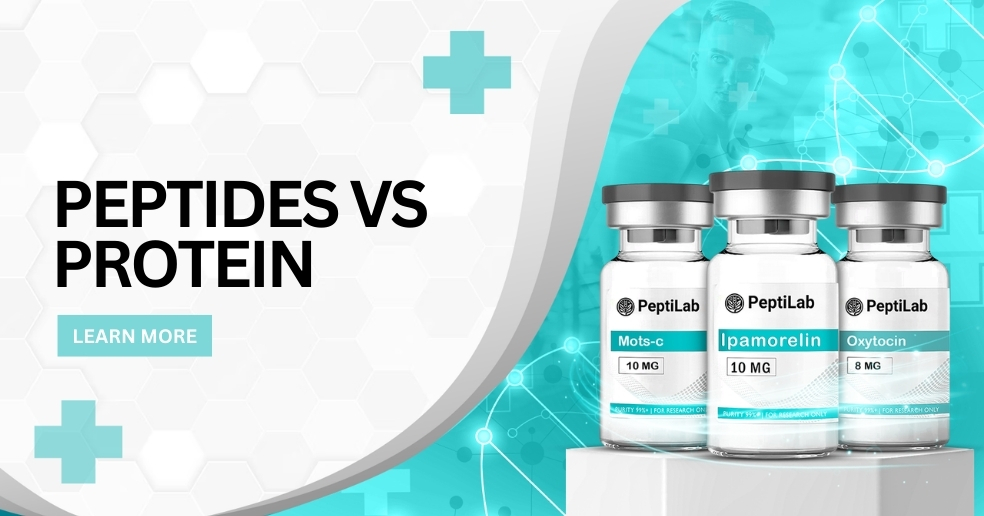Peptides
Difference Between Peptides and Proteins
In the world of health and fitness, peptides and proteins often come up as two important terms related to muscle growth, recovery, and overall well-being. While they are often used interchangeably, they are distinct molecules with different roles, structures, and benefits for the body.
This article will explore the key differences between peptides and proteins, their functions, and how each can contribute to your health goals.
What Are Proteins?
Proteins are large, complex molecules made up of chains of amino acids. These amino acids are the building blocks of life, playing a crucial role in virtually every biological process within our bodies. Proteins are necessary for the growth, repair, and maintenance of tissues, as well as for the production of enzymes, hormones, and other molecules essential for our health.
Key Functions of Proteins
- Muscle Growth & Repair: Proteins are vital for muscle tissue development and recovery after exercise or injury.
- Enzyme Production: Proteins act as enzymes, catalyzing chemical reactions in the body.
- Immune System Support: Many proteins, like antibodies, help protect the body from pathogens.
- Transport & Storage: Certain proteins transport molecules such as oxygen (hemoglobin) and store nutrients like iron.
Sources of Protein
Proteins can be found in both animal and plant-based foods, including:
- Meat, fish, and poultry
- Eggs
- Dairy products like milk, cheese, and yogurt
- Legumes such as beans and lentils
- Tofu, tempeh, and other soy products
What Are Peptides?
Peptides are smaller versions of proteins, consisting of short chains of amino acids linked by peptide bonds. While proteins are made up of 50 or more amino acids, peptides typically contain fewer than 50. Due to their smaller size, peptides are easier for the body to absorb and utilize, making them highly effective for specific therapeutic purposes.
Key Functions of Peptides
- Cellular Repair & Regeneration: Peptides play a critical role in promoting cell regeneration and tissue repair.
- Hormonal Regulation: Certain peptides can help regulate the production of hormones, such as insulin and growth hormone.
- Skin & Hair Health: Some peptides are used in skincare products to promote collagen production and improve skin elasticity.
- Fat Loss: Some peptides are believed to assist in fat loss by influencing metabolism and encouraging fat burning.
Sources of Peptides
Peptides are produced naturally within the body during protein digestion, and can also be obtained through various supplements. These supplements are typically derived from proteins found in foods such as:
- Collagen (often found in bone broth)
- Whey protein
- Milk
- Eggs
Peptides vs. Protein: Key Differences
While peptides and proteins share some similarities, their distinct characteristics make them suitable for different uses. Below is a table that compares these two molecules based on their structure, function, and potential benefits:
| Aspect | Proteins | Peptides |
| Structure | Long chains of amino acids (50+ amino acids) | Short chains of amino acids (less than 50) |
| Digestibility | Larger proteins require more time to digest | Smaller size makes them easier to digest |
| Function | Supports muscle growth, tissue repair, immune function | Promotes cellular repair, fat loss, and hormone regulation |
| Absorption Rate | Slower absorption due to size | Faster absorption and action in the body |
| Source | Animal and plant-based foods (meat, eggs, beans, etc.) | Derived from proteins or synthesized in the lab |
| Uses | Builds muscle mass, repairs tissues, supports immune system | Enhances skin health, fat burning, cell regeneration, and hormone balance |
| Formulation | Found in whole foods and protein supplements | Available as peptides or in skincare products |
| Common Benefits | Muscle gain, enhanced immunity, energy production | Skin rejuvenation, anti-aging, weight management |
| Side Effects | Generally safe in recommended amounts; excess can strain kidneys | Typically safe; may cause irritation or allergic reactions in some people |
Benefits of Protein
Proteins are essential for our overall health and are crucial for anyone involved in physical activity, muscle building, or rehabilitation. Here are some of the major benefits of consuming adequate amounts of protein:
1. Muscle Growth & Recovery
Protein is the primary macronutrient responsible for muscle repair and growth. Consuming protein after exercise helps to rebuild muscle fibers that have been broken down during strenuous activities, ultimately leading to muscle gain and strength development.
2. Weight Management
Protein is more satiating than carbohydrates or fats, helping to control hunger and promote fat loss. A higher protein intake can boost metabolism, allowing the body to burn more calories even at rest.
3. Immune Support
Proteins play a vital role in the immune system, with antibodies and other protein-based molecules helping to protect the body from infections and illnesses.
4. Skin, Hair & Nail Health
Collagen and keratin, two types of protein, are essential for the health of skin, hair, and nails. Collagen in particular helps maintain skin elasticity and moisture.
Benefits of Peptides
Peptides offer more targeted benefits, particularly when it comes to enhancing the efficiency of various biological processes. Here are some key advantages of using peptides:
1. Faster Absorption
Because peptides are smaller in size, they are absorbed and utilized by the body more rapidly than proteins. This can be especially useful for those looking for quick recovery or immediate benefits, such as athletes or people recovering from injuries.
2. Skin Health & Anti-Aging
Peptides like collagen peptides and others used in skincare products can help regenerate skin cells, reduce the appearance of fine lines and wrinkles, and promote a youthful glow. These peptides stimulate collagen production, which improves skin elasticity and hydration.
3. Fat Loss & Metabolism
Certain peptides can help regulate metabolism and fat storage in the body. They may increase the breakdown of fat, helping individuals achieve their weight loss goals. Popular peptides like AOD 9604 and melanotan II are known for their fat-burning effects.
4. Enhanced Healing & Recovery
Peptides have been shown to promote tissue repair and regeneration, which can speed up recovery from injuries and surgeries. This is especially beneficial for athletes or anyone engaged in physically demanding work.
Which Is Better: Peptides or Protein?
The choice between peptides and protein ultimately depends on your specific goals. Here are some considerations to help you decide:
- For Muscle Building: Protein is the go-to nutrient for those looking to build muscle mass or improve recovery after exercise. It provides the body with the necessary amino acids to repair and grow muscle tissue.
- For Skin Health: If you’re looking for a product to support skin health, anti-aging, or even hair growth, peptides can be more effective due to their targeted actions, such as stimulating collagen production.
- For Weight Loss or Fat Burning: Peptides may be more beneficial in promoting fat loss due to their ability to influence metabolism and increase fat breakdown.
- For Overall Health: Proteins are essential for general health, immunity, and overall bodily functions, so a balanced intake is crucial for long-term wellness.
Final Verdict
Both peptides and proteins are essential for the body but serve different purposes. While proteins are necessary for muscle building, tissue repair, and overall health, peptides offer more targeted benefits for skin health, fat loss, and hormone regulation. Depending on your health goals, either or both can play a significant role in optimizing your well-being. Always remember to consult with a healthcare provider or nutritionist to determine the best approach for your individual needs.
If you’re considering incorporating peptides into your health regimen, explore the high-quality, USA-made peptides available at Peptide Worldwide. They offer a range of products tailored to various health goals, ensuring you find the right fit for your needs.

